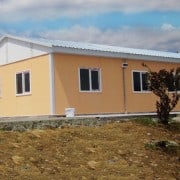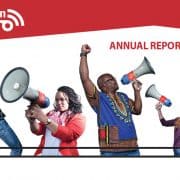|
Getting your Trinity Audio player ready...
|
This piece is extracted from Corruption Watch’s 2021 annual report. For more information, click here.
By Moepeng Talane
First published on News24
“The world will not be destroyed by those who do evil, but by those who watch them without doing anything” – a quote attributable to the late Albert Einstein, renowned all over the world for his wisdom and fortitude.
It also speaks to a principle that many in our society subscribe to, that in order for broken systems and malfunctioning governments to be fixed, it is up to the citizenry to take up that task, every day.
If we all choose to do nothing and accept that South Africa’s corruption problem is someone else’s to fix, we lose the opportunity afforded us by that most symbolic act of a democratic structure – our vote – to force change for the better.
Our collective responsibility does not end at putting an “X” next to our favoured political party or representative, but we are also encouraged, even mandated by our laws, to hold recipients of our votes accountable.
Whistle-blowers are our currency
For those who go further than most to expose the wrongs in our governing systems, there are very few rewards. But Corruption Watch (CW) has valued them since its doors first opened in 2012, because without their brave act of reporting corruption, the organisation would not be in the position that it is in today. We are 10 years strong this year because of more than 36 200 brave men and women who have brought their complaints to us.
They are called whistle-blowers because they raise the alarm on wrongdoing and enable us as a country to stop, reflect, and correct what has gone wrong in our society. To CW, they are the currency that keeps the organisation in the know about corruption and fraud, both in the public and private sectors, and enables us to investigate and expose it.
Our investigations work goes back to the beginning and has presented both triumphs and challenges alike. What drives us most is the passion with which whistle-blowers who come to us wanting to fight corruption, but understanding that their one complaint is one of many that we get. Our reciprocal passion lies in both the need for justice for those who seek our assistance, as well as the quest for accountability on the part of our government leaders.
Whistle-blowers are like you and me, and want the same things as you and me: a country that stands and thrives on the values of its people and cherishes the calling of public service. The investigations we have carried out over the years have inspired us as an organisation to do more because our whistle-blowers see the value of our fight against corruption.
We have made it our mission to bring corruption reports to the attention of affected government institutions with the expectation that measures will be taken to rectify the wrongs and hold the necessary culprits accountable. The responses over the years have been a mixed bag of positive feedback with an appetite to work with us, acts of defensiveness on the part of institutions in which we expose corruption, and even indifference to our efforts. For those within CW who work on the demanding tasks of investigating corruption reports received, it’s the quality of the results more than the quantity that gives assurance that we are winning against the scourge, one case at a time.
Corruption trends
Often we notice trends of corruption in certain sectors of our government system, and using a collection of reports relating to a particular theme, we take the approach of engaging and partnering with government departments or institutions regulating that sector for a broader response to the problem.
As mentioned above, we are not always a well-received interruption, but where we do forge good relationships we endeavour to address all aspects of whistle-blower accounts that we can, in order to find justice. Once such relationships are established and cemented on the basis of a common commitment to fix what is wrong, we develop a referral process that ensures that the institution carries forward the complaint, while also monitoring its progress. The reasons for this approach range from us having limited resources that make it a challenge to investigate each and every report, to holding the relevant institution accountable for the responsibility of probing wrongdoing and achieving an outcome.
Some of the investigations we’ve conducted ourselves from start to end have resulted in definitive action taken against perpetrators, while some remain unresolved. For our small team of investigators, the rewards are in the little steps taken in the pursuit of accountability, even though justice is not guaranteed.
Below are some of the broad themes under which our investigations work has focused over the past decade:
Community projects under the spotlight
One of our first and biggest investigations was exposed around our first anniversary, in January 2013, and involved a case of fronting in a R30-million community project managed by rural NGO Mvula Trust. Mvula had bid in a project that was part of the Department of Cooperative Governance and Traditional Affairs’ (Cogta) community works programme (CWP), and was later contracted as a lead agent.
Under Mvula, hundreds of unemployed people in different parts of the country would find employment in small projects relating to construction, maintenance of the built environment and other areas.
But our investigation found that Mvula sub-contracted a significant part of the awarded contract to a third party, in an arrangement where neither Mvula nor the third party, Ubuntu Sima, disclosed the latter’s involvement in the initial bidding documents as required. Interestingly, the Mvula board was also chaired by a sitting deputy minister at the time, Rejoice Mabhudafasi.
The revelations followed a four-month investigation that revealed several questionable links relating to conflicts of interest between Mvula and Ubuntu Sima. CW submitted its findings to Cogta in May 2013 as part of an internal enquiry that the department was to conduct into the CWP.
Still on the community work theme but on a smaller scale, the Johannesburg Child Welfare also came on our radar when an employee alleged abuse of power by its director Lyn Perry in 2014. The whistle-blower approached CW after submitting a dossier to the Gauteng department of social development back in 2013, which they claimed was aimed at correcting Perry’s conduct. The broad allegations against Perry included the mismanagement of the NGO’s funds; the flouting of supply chain procedures; and the abuse of its resources for her own personal gain.
Perry’s lawyers wrote to CW demanding that an article published on the matter be removed from our website. In the correspondence, there is a categorical denial of the allegations in the department’s report and questions are raised about the purpose of the investigation. Their claim was that the investigation by the department had not followed proper processes. The article remains on our site.
The problem with schools
The quality of the schools in our communities helps define the quality of those communities, and when good values are not only taught but also practised at school, it is the community that benefits, knowing that their children’s education and personal development are in safe hands.
Corruption happening in public schools became one of our focus areas after CW noticed towards the end of its first year that a significant number of the reports we were getting involved these educational institutions. In January 2013, we launched our schools campaign, which grew to become one of our most successful. The report numbers grew even more once the public profile of the campaign widened, and they informed a major part of our investigations work.
From teachers to school governing body members and ordinary parents, the reports carried a common theme: the mismanagement of school resources by those in positions of leadership.
There was the collusion between principals and SGB chairpersons in the abuse of school funds; school administrators helping themselves to funds and learning materials and other resources; principals and other education officials creating “ghost teachers” in order to benefit from the salaries drawn; and even the coercion of learners into sex-for-marks schemes. Quite alarming were the allegations around teacher unions’ involvement in jobs-for-pals schemes. All these areas were investigated, but for some, there were no conclusive outcomes due to lack of access to witnesses or information.
Our Loss of Principle report published in October 2015 highlighted the complicity of principals in 10 investigations that we drew from the ever-growing pool. Our probe into each of them revealed sinister motives of principals siphoning funds and resources in various ways, faking higher pupil marks, and even intimidating school governing body members.
Responding to an increasing number of complaints alleging gross financial mismanagement of various kinds, we discerned a need to develop a pilot project specifically for schools complaints, for the purpose of addressing and finding concrete solutions on the various allegations brought to our attention.
The legal and investigation team launched the pilot project in 2021, conducting preliminary investigations and more research into the allegations of corrupt activities happening in various schools.
Following our investigations, we took steps to address the situation, including engagements with the Department of Education’s senior officials, and sending complaints and enquiries to the department. We decided to deal with each matter case by case and have identified the department’s district offices with which we can work to combat and address the raised concerns.







